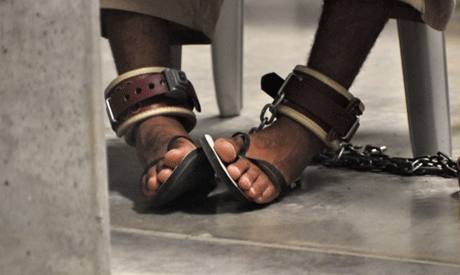
A detainee's feet shackled to the floor, (Photo: Reuters).
Britain scrapped an inquiry into whether its security services knew about the torture of terrorism suspects overseas, because police have launched a separate investigation into whether London illegally sent detainees to Muammar Gaddafi's Libya.
Prime Minister David Cameron announced in July 2010 he was setting up an inquiry, led by retired appeals court judge Peter Gibson, to investigate whether British agents had worked with foreign security services who abused detainees.
But the inquiry was barred from examining matters that were before the police, and never formally launched hearings because it was waiting for criminal investigations to conclude.
Police announced last week that they would investigate allegations that two people had been illegally handed over to Gaddafi's Libya. Jutice Minister Ken Clarke said on Wednesday this meant there was no prospect of the Gibson inquiry being able to start in the foreseeable future.
"So ... we have decided to bring the work of this inquiry to a conclusion," he told parliament.
He said the government still intended to hold an independent, judge-led inquiry into possible British collusion with torture once the police had ended their investigations.
One of the cases being investigated by British police involves Abdel Hakim Belhadj, a Libyan Islamist who became a leader of the resistance to Gaddafi and has emerged as a major figure in Libya after the former leader's downfall.
He alleges he was tortured for six years after British and U.S. agents delivered him to Libya in 2004, allegations that are deeply embarrassing to London.
"We welcome the scrapping of this inquiry," said Richard Stein from law firm Leigh Day & Co which is representing Belhadj and another Libyan man.
"It was ill-conceived from the beginning, the government reserved the right for the final say on what material would be published and did not allow for cross-examination or any other way of testing the evidence from members of the UK security services, which was to be given secretly."
Clarke said the Gibson inquiry would give the government a report on the preparatory work it had done and "as much of this report as possible" would be made public.
Human rights groups and campaigning lawyers said last year they would boycott the inquiry because it risked becoming a "whitewash".
Clare Algar, Executive Director of Reprieve, one of those groups, said it looked forward to working with the government to ensure that an inquiry with "real clout and real independence" was set up once police investigations were over.
Members of the British domestic intelligence agency MI5 and its foreign equivalent MI6 have for years faced accusations they colluded in ill treatment of detainees, often at the hands of U.S. authorities after the Sept. 11, 2001 attacks on the United States.
The allegations have been denied by current and former heads of MI5 and MI6 and British authorities say they would never use, or encourage others to use, torture to gain information.
The Gibson inquiry was set up to examine allegations made by several Britons of Pakistani descent that they were abused in custody in Pakistan with complicity from British officials. It would also have looked at allegations of mistreatment of those held at the U.S. prison at Guantanamo Bay, Cuba.
British police and prosecutors said last week they had found insufficient evidence to bring any charges after investigating the mistreatment of former Guantanamo Bay detainee Binyam Mohamed and the alleged abuse of an unnamed individual held by U.S. authorities at Bagram Air Base in Afghanistan.
In November 2010, Britain agreed to make payments to 16 former Guantanamo Bay detainees in out-of-court settlements over allegations they were mistreated abroad with the knowledge and in some cases complicity of British security services. Britain said the payments were not an admission of culpability.
Short link: